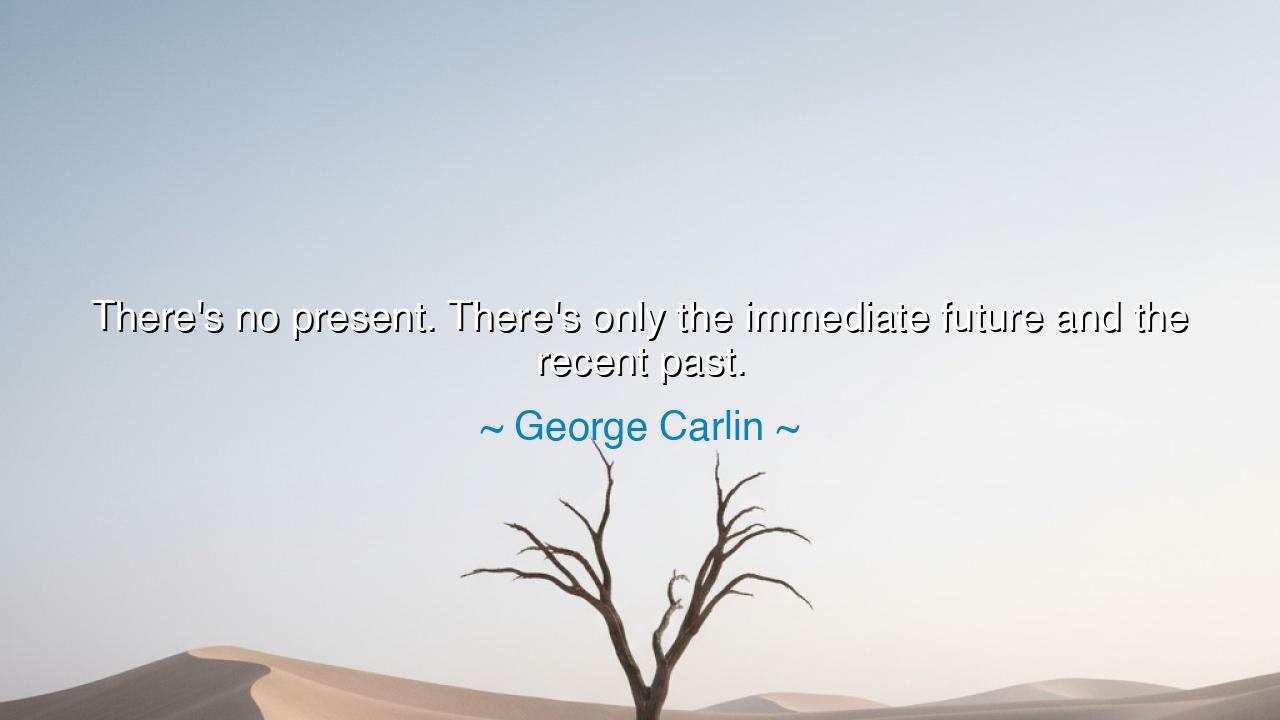
There's no present. There's only the immediate future and the






In the quiet passage of time, George Carlin's words, "There's no present. There's only the immediate future and the recent past," speak to the transient nature of time itself. These words, though spoken with Carlin’s characteristic wit and humor, reveal a profound truth about how we perceive and experience the world. The present, as we often think of it, is fleeting—gone as soon as we try to grasp it. The immediate future is always just out of reach, a destination we constantly move toward, and the recent past is what we carry with us, shaping our present actions and thoughts. Time, in this sense, is a continuous flow, a river that cannot be caught in a single moment.
The ancients understood this flow of time and the elusive nature of the present moment. Heraclitus, the Greek philosopher, famously said, “You cannot step into the same river twice.” The river of life is always in motion, just as the present is always slipping away into the past and stretching into the future. The present moment, though we may try to hold on to it, is like water slipping through our fingers. The only truth we have is that we are constantly in transition, constantly moving from what was to what will be, and the present, though real, is often a fleeting illusion.
Consider the life of Alexander the Great, a man who was constantly propelled by the future. His ambition to conquer the world left him ever focused on the horizon, where the next battle awaited, and the next empire to be built. Yet, for all his achievements, Alexander was never able to fully savor the present moment. Even on his deathbed, he was already thinking of what lay ahead for his empire, instructing that his kingdom be left to “the strongest.” In his relentless pursuit of what was to come, he lost the ability to appreciate the fleeting moments of his life. Alexander’s story reminds us that while the future is a powerful motivator, it is the present—however fleeting—that we should embrace with gratitude and awareness.
Similarly, Julius Caesar, in his quest for greatness, was forever looking forward to his next victory, yet his present actions, even the smallest moments, led him to the fateful end at the hands of those closest to him. Caesar’s obsession with the future blinded him to the growing resentment in the present moment, leading to his betrayal. His assassination marked a sudden end to the future he had envisioned, showing us how the immediate future can quickly turn to a tragic past when we fail to appreciate the moment we are living in. Caesar’s life teaches us that the constant pursuit of tomorrow can make us blind to today, to the people and experiences that surround us.
The lesson Carlin imparts, rooted in his comedic reflection, is a profound one: time is always slipping away, and we are often so caught up in our desires for the future or our memories of the past that we forget to truly live in the moment. Just as Socrates believed that the examination of life was essential to wisdom, Carlin reminds us that to truly understand life, we must acknowledge that the present is fleeting. The future will always be just beyond our grasp, and the past will always be a shadow, but what truly matters is how we engage with the now—with the people, tasks, and experiences that are before us.
In our own lives, we must strive to embrace the present, to live in the moment, not by ignoring the future or the past, but by understanding that life is a continuous movement, and the present is the only part of time we truly possess. Planning for the future is important, but it should not overshadow the richness of today’s opportunities. To act with mindfulness, to savor the people we are with, and to engage in the tasks we have before us—these are the things that give life meaning. Like a painter standing before a blank canvas, the brush of the present moment creates the image of our future, yet it is shaped by the choices we make today.
Thus, let us not be prisoners of the past or slaves to the future. Instead, let us live fully in the present, recognizing that it is in the immediate now that we have the power to shape our destinies. By taking action in the present, with awareness and intention, we make the future a reality. By appreciating the present, we can reflect on the past with wisdom, knowing that it is the actions we take today that create the memories we will carry forward. The flow of time is constant, and the river of life moves ever forward—let us learn to step into it with grace, embracing the now before it slips away into memory.






AAdministratorAdministrator
Welcome, honored guests. Please leave a comment, we will respond soon